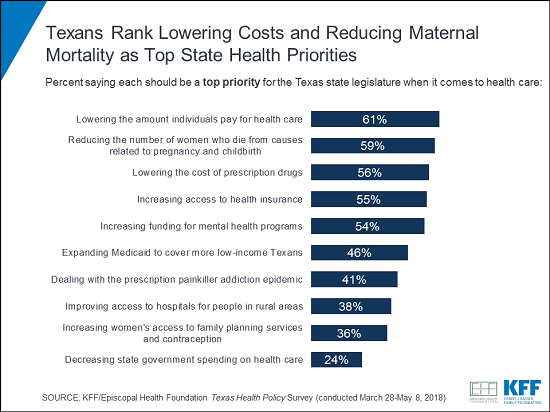
The independent source for health policy research, polling, and news.
KFF/EHF Poll: Texans’ Top State Health Priorities Include Lowering Out-of-Pocket Costs and Reducing Maternal Mortality
Two Thirds of Texans Say the State is Not Doing Enough to Help Low-Income Adults Get Health Care
Most Texans Don’t Know their State has the Nation’s Highest Uninsured Rate
Texans’ top health care priorities for the state revolve around making health care and prescription drugs more affordable, reducing maternal mortality and increasing access to health insurance coverage, finds a new statewide Kaiser Family Foundation/Episcopal Health Foundation survey on Texas health policy issues.
Majorities say “top priority” should be given to lowering what people pay for health care (61%), reducing maternal mortality (59%), lowering prescription drug costs (56%), increasing access to health insurance (55%) and boosting funding for mental health programs (54%).
Nearly half (46%) of Texans say expanding Medicaid to cover more low-income Texans should be a top priority. At the same time, the poll finds that two thirds (64%) say that the state is not doing enough to help low-income adult residents get needed health care, and the same majority (64%) favor expanding the state’s Medicaid program to cover more low-income adults.
Texas is one of 17 states that has not expanded its Medicaid program under the Affordable Care Act, which requires the federal government to pay the vast majority of the cost of expanded coverage.
Large majorities of Texas Democrats (82%) and independents (71%) support Medicaid expansion in the state, while most Republicans (59%) prefer keeping the state’s Medicaid program as it is today. Lower-income residents are most likely to support expansion, though a majority of those with higher incomes also favor it.
When asked about whether the state is doing enough to help other groups get needed health care, Texans are more mixed. Half say the state is doing enough to help children (50%) and pregnant women (50%), while fewer (42%) say the state is doing enough to help immigrants.
Texas currently has more residents without health insurance than any other state and has the highest uninsured rate in the country (21% among adults ages 19-64, compared to 12% nationally). However, most Texans don’t realize it.
The poll finds that three in 10 (31%) correctly say that Texas has an above-average uninsured rate, while about one in five (19%) incorrectly say it has a below-average uninsured rate. The rest say either that it is about the same (34%) or that they don’t know (16%).
The findings are from the first report in a series drawing on a new KFF/EHF survey of Texans on their views of and experiences around health policy and Medicaid. Future reports will examine health care costs, the experiences of Texans with private insurance, and women’s health care.
When asked about state budget priorities overall, a majority (54%) of Texans say they favor increased spending on health care programs – fewer than say the same about public education (71%) and similar to the shares who want increased spending on infrastructure (55%) and public safety (52%).
Most Texans (60%) say Medicaid is important to their families, and the same share (60%) say the state’s Medicaid program is working well for those low-income residents who are already covered by the program.
Overall, seven in 10 (71%) Texans report a personal connection to someone covered by the Medicaid program – including those who have personally received Medicaid assistance (31%), have had a child covered (11%), or have a close friend or family member who has been covered (29%).
Like Americans overall, Texans are also divided in their views of the 2010 Affordable Care Act. Roughly equal shares of Texans hold favorable (48%) and unfavorable (47%) views of the law sometimes called Obamacare. In the latest national Kaiser Health Tracking Poll, 49% of Americans overall had a favorable view of the law and 42% were unfavorable.
Designed and analyzed by researchers at the Kaiser Family Foundation and the Episcopal Health Foundation, the Texas Health Policy Survey was conducted from March 28-May 8, 2018 among a random digit dial telephone sample of 1,367 adults living in Texas. Interviews were conducted in English and Spanish by landline (439) and cell phone (928). The margin of sampling error including the design effect for the full sample is plus or minus 3 percentage points. For results based on subgroups, the margin of sampling error may be higher.
The Episcopal Health Foundation (EHF) believes all Texans deserve to be healthy. EHF is committed to transforming the health of our communities by going beyond just the doctor’s office. By providing millions of dollars in grants, working with congregations and community partners, and providing important research, we’re supporting solutions that address the underlying causes of poor health. EHF was established in 2013 and is based in Houston. With more than $1.2 billion in estimated assets, the Foundation operates as a supporting organization of the Episcopal Diocese of Texas and works across 57 Texas counties. #HealthNotJustHealthcare

